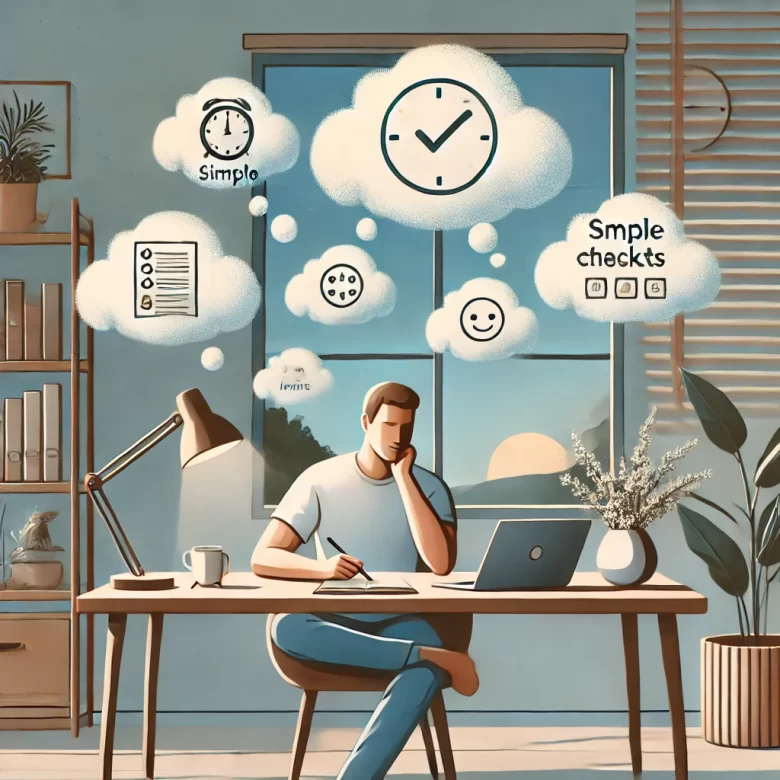In today’s fast-paced world, we are constantly bombarded with choices. From the moment we wake up to the time we go to bed, every action seems to require a decision. What to eat for breakfast, which route to take to work, whether to check emails or social media—it can feel endless. This constant need to make decisions, big and small, often leads to what’s known as decision fatigue. Decision fatigue is the mental exhaustion that occurs after making too many choices, leading to poorer decision-making, stress, and burnout.
We’ve all been there: overwhelmed by the sheer number of decisions we have to make each day. The more choices we face, the harder it becomes to make clear, thoughtful decisions, and the more mental clutter we accumulate. This mental overload can significantly impact our productivity, our relationships, and even our happiness.
Understanding Mental Overload
What is Mental Overload?
Mental overload is a state of cognitive exhaustion that occurs when your mind is overwhelmed by too many demands, thoughts, or stimuli. It’s the feeling of being mentally “full,” unable to focus or make decisions, and constantly stretched thin. This overload can manifest in a variety of ways, from difficulty concentrating on tasks to feeling constantly drained, even after a full night’s sleep. Common signs of mental overload include burnout, a sense of mental fog, and an inability to focus on even simple tasks. You may find yourself becoming forgetful, easily irritated, or emotionally distant, as your brain struggles to process all the demands placed upon it.
Causes of Mental Overload
There are several factors that contribute to mental overload, particularly in our modern, fast-paced world.
Constant Decision-Making in Daily Life
Every day, we make hundreds of decisions—whether it’s choosing what to wear, what to eat, or how to respond to messages and emails. While some decisions are routine and require little thought, others demand more attention and energy. Over time, the accumulation of all these decisions can wear you down, making it harder to think clearly and act efficiently.
Information Overload from Digital Devices
With constant access to digital devices, we are bombarded with information from emails, social media notifications, news updates, and more. This endless stream of data can quickly overwhelm the mind, making it difficult to focus on one thing for too long. The pressure to stay informed and respond quickly to every piece of information can create a sense of chaos and contribute significantly to mental overload.
Effects on Productivity and Well-being
Mental overload doesn’t just affect how we feel; it also impacts our performance and relationships. When the mind is cluttered and overwhelmed, it becomes difficult to focus, which can lead to decreased productivity. Tasks that were once easy to accomplish may take longer to complete, and the quality of work may suffer as a result.
In relationships, mental overload can create distance. When we’re mentally exhausted, we may struggle to be present with loved ones or to communicate effectively. We may become short-tempered, withdraw, or find it hard to empathize, which can strain personal connections.
The Importance of Simple and Conscious Decisions
What Are Simple and Conscious Decisions?
In the face of constant decision-making, it can be easy to feel overwhelmed. But what if the key to alleviating mental overload lies not in making fewer decisions, but in making simpler and more conscious ones?
A simple decision is one that is straightforward, without unnecessary complexity or confusion. It’s a decision that doesn’t require excessive deliberation or create mental clutter. It’s about choosing the path that feels natural or easy, without overthinking or second-guessing. A conscious decision, on the other hand, is one made with awareness and intention. It involves taking a moment to pause, reflect, and choose what aligns best with your values, needs, and long-term goals.
Examples of Simple Decisions:
- Organizing Your Workspace: By creating a clean, clutter-free work environment, you reduce the number of decisions you need to make about where things are or how to navigate your space. This simple action allows your mind to focus on more important tasks without the added stress of a chaotic environment.
- Limiting Digital Distractions: Choosing to silence notifications or schedule specific times to check your phone is a conscious decision that reduces the constant pull of distractions. By consciously limiting digital interruptions, you preserve your mental space for deep focus and meaningful tasks.
How Conscious Choices Promote Mental Clarity
The act of making conscious decisions is more than just about simplifying life—it’s about creating mental clarity. When we make decisions with intention, we engage in a form of self-regulation that allows us to manage stress and reduce the noise that surrounds us. Conscious decision-making gives us control over our actions, rather than feeling like we’re constantly reacting to external demands.
The Science Behind Conscious Decision-Making and Its Benefits on Mental Health:
Studies have shown that our brains experience less stress when we make decisions with intention. When we’re faced with too many choices, our cognitive resources become depleted, leading to decision fatigue. However, when we practice conscious decision-making, we give our brains a break from the overwhelming stream of decisions, thus preserving mental energy. This not only helps us make better choices, but also promotes a sense of calm and well-being.
Moreover, making conscious decisions can have a positive impact on mental health by reducing anxiety. Instead of feeling overwhelmed by an endless array of options or responsibilities, making thoughtful, deliberate choices allows us to feel more in control of our lives.
How Small, Intentional Choices Lead to Less Stress and Greater Focus:
The power of simple and conscious decisions lies in their ability to reduce the cognitive load on our minds. By focusing on the essentials and making intentional choices, we free up mental energy for more important tasks. For example, when you make the conscious choice to prioritize your health—whether through getting enough sleep, eating nutritious meals, or exercising regularly—you’re creating a foundation for clearer thinking and improved focus.
On a larger scale, simplifying decisions in your daily life helps you conserve mental energy for more significant, long-term choices. Rather than getting bogged down by endless trivial decisions, you can focus on what truly matters—your goals, your values, and your well-being. In doing so, you’re not just reducing stress; you’re creating an environment where you can thrive mentally, emotionally, and physically.
Strategies to Make Simple and Conscious Decisions
Making simple and conscious decisions doesn’t have to be difficult. By adopting a few key strategies, you can reduce mental overload and streamline your decision-making process. Here are some effective methods for simplifying your choices and maintaining a clearer, calmer mind.
Declutter Your Environment
A cluttered space often leads to a cluttered mind. When we are surrounded by chaos—whether in our physical surroundings or on our digital devices—it’s easy to feel overwhelmed and mentally drained.
- Physical Decluttering: Begin by organizing your workspace, home, and even your car. By eliminating unnecessary items, you create a space that is calm and conducive to focus. Fewer items mean fewer decisions about what to do, where to put things, or how to manage your space. This small change can make a big difference in reducing mental overload.
- Digital Decluttering: The same principle applies to the digital realm. Clean up your desktop, unsubscribe from unnecessary email lists, and organize your apps or files. Constantly checking through an overcrowded inbox or dealing with endless notifications can make you feel mentally exhausted. Reducing these distractions helps clear your mind and allows you to focus on what truly matters.
Benefits of Having Fewer Options in Your Environment:
The fewer options we have to choose from, the easier it becomes to make decisions. This principle, known as the “paradox of choice,” suggests that having too many choices can lead to decision fatigue and anxiety. By intentionally reducing the options available to you—whether in your physical space or on your devices—you’re making it easier to make quick, clear decisions that don’t drain your mental energy.
Create Routines and Set Boundaries
Routines Simplify Daily Choices: When you establish a routine, you automate many of the decisions that would otherwise require mental energy. From what time you wake up to what you eat for breakfast, routines remove the need for constant decision-making, leaving you with more mental energy for higher-priority tasks. For example, if you make a habit of exercising first thing in the morning or meal-prepping for the week, these decisions no longer take up valuable time or cause stress.
Prioritize Decisions Based on Values
When faced with a multitude of choices, it can be helpful to prioritize decisions that align with your core values and long-term goals. This method ensures that you’re making decisions that are meaningful and in line with your personal vision, rather than getting distracted by short-term desires or external pressures.
Focus on What Matters Most: Take a moment to reflect on your values and what you truly want out of life. This clarity will guide your decisions, making it easier to say “no” to things that don’t serve your long-term vision. When you make decisions based on your values, you’re investing in your well-being and purpose rather than reacting to fleeting, superficial desires.
Practice Mindfulness and Self-Reflection
Mindfulness and self-reflection can be invaluable tools when it comes to making conscious, deliberate decisions.
Mindfulness to Make Deliberate Decisions: Mindfulness involves being fully present in the moment and making decisions without being overwhelmed by distractions or emotional reactions. By practicing mindfulness, you become more attuned to your thoughts, feelings, and impulses, allowing you to make decisions based on clarity rather than on impulse or stress. Mindfulness helps you slow down, observe your options, and choose the best course of action without mental clutter.
Reflection Practices: Taking time to reflect on past decisions and experiences can also help you make better choices moving forward. Set aside time each day or week to evaluate how your decisions are impacting your life and well-being. Reflection can help you recognize patterns in your decision-making and give you insight into how you can simplify or improve your choices. By reflecting regularly, you reduce the likelihood of making hasty, emotionally-driven decisions that might lead to regret later.
Benefits of Simple and Conscious Decisions
Making simple and conscious decisions isn’t just about reducing mental overload—it offers a wide range of benefits that can improve your overall well-being, productivity, and mental health. By intentionally simplifying your choices, you not only conserve mental energy but also create space for more meaningful, focused actions. Let’s explore the key benefits of making simpler, more deliberate decisions.
Reduced Decision Fatigue
One of the most immediate benefits of simplifying decisions is a significant reduction in decision fatigue. Decision fatigue occurs when your brain becomes drained from making too many choices, leading to mental exhaustion and poor decision-making. When you’re faced with a multitude of decisions, big or small, it can be difficult to stay sharp and focused.
By consciously simplifying your decision-making process—whether through routines, boundaries, or prioritizing what matters—you reduce the number of decisions your brain has to process each day. This not only restores energy but also promotes greater mental clarity. When you’re not constantly weighing options or feeling overwhelmed by choices, your mind can focus on more important tasks, leading to a clearer, more energized mindset.
Enhanced Focus and Productivity
When we simplify our decisions, we free up mental resources to focus on what really matters. Fewer, but more intentional decisions, allow us to direct our attention toward more significant tasks, rather than getting bogged down by trivial or repetitive choices.
For instance, if you’re not wasting time deciding what to eat or when to check your emails, you can devote that energy to projects that require deep concentration and creativity. This increased focus leads to enhanced productivity, as you can work more efficiently and accomplish tasks more effectively. By reducing distractions and unnecessary decisions, you’ll find yourself getting more done in less time.
Improved Mental Health and Well-being
The mental clarity and focus that come with simplifying your decision-making can have a profound impact on your mental health and well-being. When your mind isn’t overwhelmed by constant choices or information overload, you create more space for emotional resilience and a sense of calm.
Lower stress levels are one of the most notable benefits of making conscious decisions. With fewer decisions to make, you experience less anxiety about making the “wrong” choice. You’re able to approach challenges with a clearer mindset, which leads to a more balanced emotional state. As a result, you’re better able to handle life’s stresses and maintain a sense of inner peace, even in chaotic situations.
Common Pitfalls to Avoid
While simplifying and making conscious decisions can significantly reduce mental overload, there are a few common pitfalls that can derail your efforts. It’s important to be aware of these challenges so that you can stay on track and continue making decisions that promote mental clarity and well-being. Here are the key pitfalls to avoid:
Overthinking Decisions
One of the biggest obstacles to making simple and conscious decisions is overthinking. It’s easy to get caught up in the endless cycle of “What if?” questions, worrying about every possible outcome or second-guessing your choices. Overthinking often leads to analysis paralysis, where you become so bogged down in deliberation that it becomes difficult to make any decision at all. This only contributes to mental clutter and stress.
The key to overcoming overthinking is to trust your judgment. Remember that most decisions don’t require endless scrutiny. Often, we already know what the best choice is deep down—we just need to stop ourselves from overcomplicating it. Keep in mind that not every decision needs to be perfect.
Avoiding Indecision
Another major pitfall is indecision. Indecision occurs when you’re unable or unwilling to make a choice, often due to fear of making the wrong one. This state of uncertainty can be just as mentally draining as constantly making decisions. When we avoid making choices, we allow stress to build, leading to more confusion and anxiety.
Indecision often stems from the fear of failure or regret, but in reality, not making a decision can often be worse than making a choice and adjusting as you go. Indecision prolongs the mental overload, as it keeps your brain in a constant state of limbo. To combat indecision, take action even if you’re not 100% sure. Start by making small, low-risk decisions, and build confidence in your ability to choose. Remember, making a decision—even if it turns out to be imperfect—is a step toward clarity and progress.
Neglecting Self-Care
A critical aspect of making conscious decisions is the awareness that self-care must be a priority. Too often, in the rush of managing tasks and responsibilities, we forget to care for our physical and mental health. However, neglecting self-care only adds to mental overload and reduces your ability to make clear, thoughtful decisions.
In a world filled with constant choices, making simple and conscious decisions is more important than ever. By reducing the mental clutter caused by excessive decision-making, you can protect your mental energy, regain clarity, and find a sense of balance. The power of simple decisions lies in their ability to ease mental strain, increase focus, and improve overall well-being. When you choose intentionally and mindfully, you reduce the burden of overthinking, avoid unnecessary stress, and create space for what truly matters.




